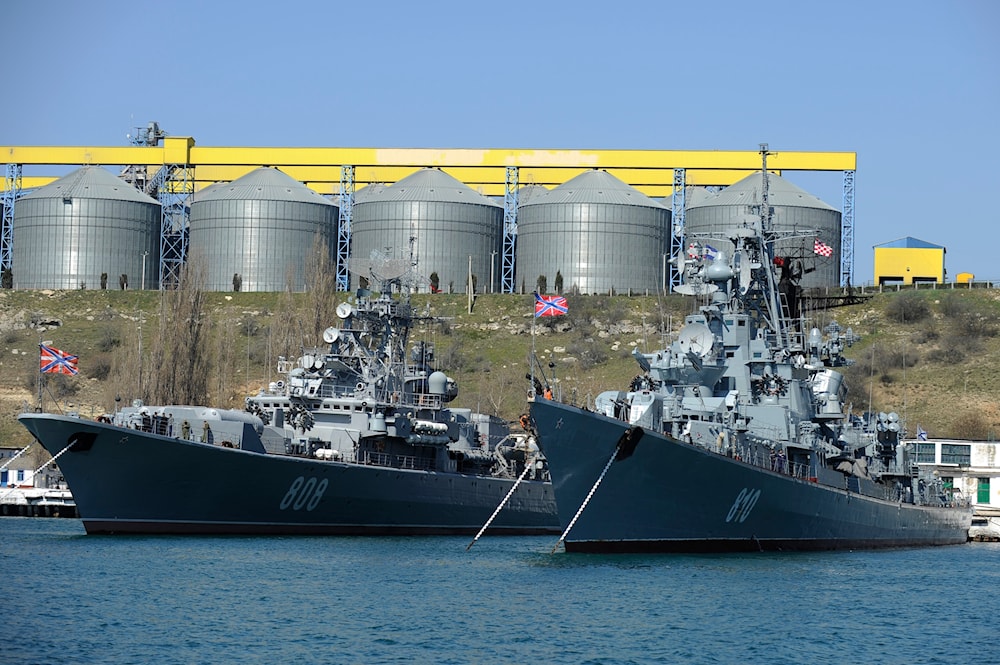US delegation seeks Black Sea ceasefire in Ukraine-Russia talks
The White House has stated that the primary objective of the talks is to secure a maritime ceasefire in the Black Sea to ensure uninterrupted shipping.
-
 Russian Black Sea fleet ships are anchored in one of the bays of Sevastopol, Crimea, on March 31, 2014. (AP)
Russian Black Sea fleet ships are anchored in one of the bays of Sevastopol, Crimea, on March 31, 2014. (AP)
A US delegation is set to engage in talks with Russian officials on Monday, seeking to establish a Black Sea ceasefire and work toward a broader cessation of hostilities in Ukraine.
This follows discussions with Ukrainian diplomats on Sunday.
These technical talks take place as US President Donald Trump intensifies his push to halt Russia's ongoing three-year offensive in Ukraine. Last week, Trump spoke separately with both Ukrainian President Volodymyr Zelensky and Russian President Vladimir Putin.
According to a source familiar with the discussions, the US delegation is led by Andrew Peek, a senior director at the White House National Security Council, and Michael Anton, a senior State Department official. They met with Ukrainian officials on Sunday evening and are scheduled to meet with their Russian counterparts on Monday.
The White House has stated that the primary objective of the talks is to secure a maritime ceasefire in the Black Sea to ensure uninterrupted shipping.
Broader ceasefire and security measures
Speaking on CBS' Face the Nation on Sunday, White House national security advisor Mike Waltz confirmed that US, Russian, and Ukrainian delegations were present in the same facility in Riyadh.
Beyond the Black Sea ceasefire, the discussions will also cover "the line of control" between Ukraine and Russia. Waltz explained that this would involve "verification measures, peacekeeping, freezing the lines where they are." Additionally, confidence-building measures such as "the return of Ukrainian children taken by Russia" are on the agenda.
Russia’s delegation will include Grigory Karasin, chair of the Federation Council's Foreign Affairs Committee, and Sergei Beseda, an advisor to the director of the Federal Security Service.
Ukraine’s Defense Minister, Rustem Umerov, who leads the Ukrainian delegation, stated on Facebook that the US-Ukraine discussions focused on proposals to protect energy infrastructure and other critical facilities.
Trump’s policy shift and European concerns
Following Russian territorial gains in 2024, Trump reversed the previous US stance on the conflict. He initiated direct negotiations with Moscow and suspended military aid to Ukraine, conditioning further assistance on steps toward ending the war.
US special envoy Steve Witkoff, who met Putin in Moscow earlier in March, sought to reassure NATO allies that a potential deal would not embolden Russia to expand further into Europe.
"I just don't see that he wants to take all of Europe. This is a much different situation than it was in World War Two," Witkoff told Fox News.
"I feel that he wants peace," he added, referring to Putin.
Trump, who has long pledged to bring an end to the deadliest conflict in Europe since World War Two, has alarmed European allies with his direct engagement with Putin. Many fear this marks a shift away from decades of US policy centered on countering Russia.
Progress and remaining challenges
Earlier this month, Putin stated he supported Washington's truce proposal in principle but insisted on addressing key conditions before fully committing.
Ukrainian Foreign Ministry spokesperson Heorhii Tykhyi confirmed that US and Ukrainian officials are working to “clarify the modalities, the nuances of possible different ceasefire regimes, how to monitor them, how to control them, in general, what is included in their scope."
Last Tuesday, Putin agreed to Trump’s proposal for a 30-day halt to attacks on Ukrainian energy infrastructure and ordered Russian forces to comply. However, this fell short of a broader 30-day ceasefire that the US and Ukraine had sought.
Trump described efforts to de-escalate the conflict as "somewhat under control."
The US hopes to secure a comprehensive ceasefire within weeks, with Bloomberg News reporting that a truce agreement is being targeted for April 20.
Despite ongoing diplomatic efforts, hostilities continue. Both Russia and Ukraine have reported new strikes, and Russian forces are still advancing in eastern Ukraine, an area Moscow claims to take over.
Read more: Kiev lost 500+ troops in past 24 hours: Russian Defense Ministry

 4 Min Read
4 Min Read









